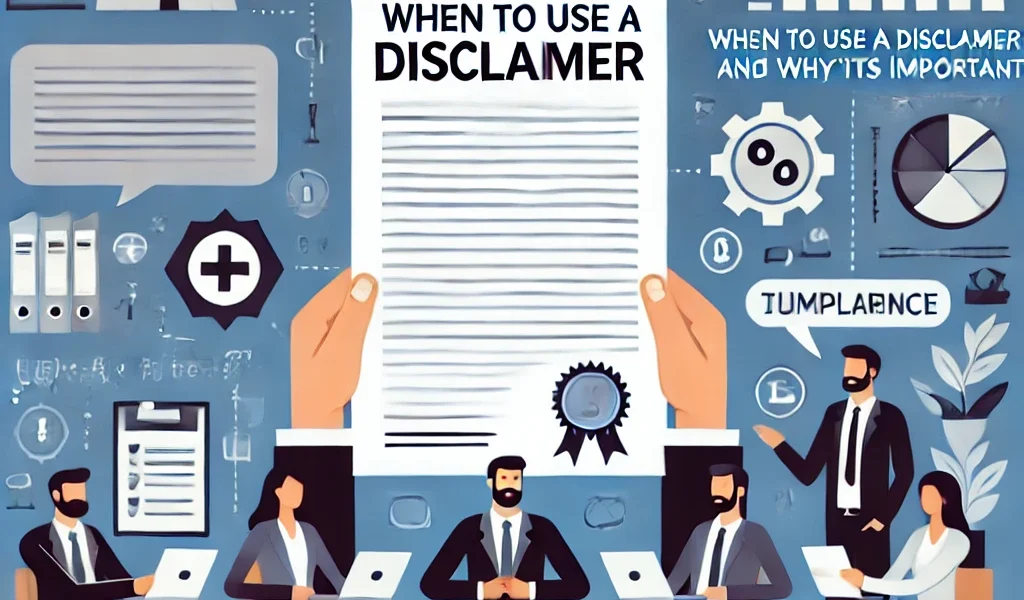When to Use a Disclaimer in Business and Why It’s Important
In today’s business environment, protecting both your company and your clients through clear and transparent rules is essential. One of the tools that entrepreneurs use to protect their business from legal risks is a disclaimer. But what exactly is a disclaimer, when do you need to use one, and how should it be properly formulated? In this article, we’ll explore key situations where a disclaimer can be crucial for your business.
What is a Disclaimer?
A disclaimer is a legal statement that informs users, customers, or visitors that the information, products, or services provided by the company are not intended for a specific purpose or that the company is not responsible for certain situations that may arise from the use of its services or products. The primary purpose of a disclaimer is to protect the business from potential legal claims.
When to Use a Disclaimer in Business?
There are several situations where using a disclaimer is not only helpful but also necessary:
- Websites and Blogs
If you operate a website, blog, or online platform that provides information, advice, or opinions, it’s important to include a disclaimer. This ensures visitors are aware that the content is informational and that your company is not liable for any misunderstandings or damages that may occur from using the information.- Example: “The information on this website is provided for general informational purposes only and should not be construed as legal or professional advice.”
- Financial, Health, or Legal Advice
If you provide services related to financial planning, health (such as medical advice), or legal counseling, it’s crucial to make it clear that your advice is general in nature and may not apply to specific individual situations. A disclaimer protects you from being held liable for any outcomes based on your advice.- Example: “We do not provide medical, legal, or financial advice. Always consult a professional before making any significant decisions.”
- Affiliate Marketing or Sponsored Content
If your business includes affiliate marketing or sponsored content (e.g., reviews of products or services where you earn a commission), a disclaimer is necessary to inform your audience of this relationship. Transparency is essential in this case, as it builds trust with your audience and complies with advertising regulations.- Example: “This post contains affiliate links. We may receive a commission if you purchase through these links, at no additional cost to you.”
- Product or Service Limitations
When selling products or services, it’s common to use a disclaimer to outline any potential limitations or risks involved. This is especially important if the product or service could cause harm if not used correctly, or if the results vary from person to person.- Example: “This product is not intended to diagnose, treat, cure, or prevent any disease. Results may vary depending on individual circumstances.”
- E-Commerce or Online Sales
For businesses involved in e-commerce, it’s important to have a disclaimer regarding product availability, shipping times, and return policies. This helps manage customer expectations and protects your business from complaints or disputes.- Example: “Product availability is subject to change without notice. Shipping times are estimated and may vary.”
Benefits of Using a Disclaimer
- Legal Protection
A well-crafted disclaimer can limit your business’s liability in various situations. By making it clear what your business is or isn’t responsible for, you reduce the risk of legal claims against your company. - Transparency with Customers
Including a disclaimer promotes transparency with your customers or clients, building trust by clearly communicating the scope of your services or products. - Clarifying Your Responsibilities
Disclaimers set boundaries for what your business is responsible for. This can be particularly important in industries like finance, healthcare, and legal services, where incorrect or misunderstood advice could have serious consequences. - Compliance with Regulations
In many industries, including a disclaimer is required by law or by regulatory bodies. For example, businesses involved in affiliate marketing must disclose their relationships with advertisers, and financial advisors must clarify that past performance is not indicative of future results.
How to Write an Effective Disclaimer
When writing a disclaimer, it’s important to:
- Be Clear and Concise: Avoid legal jargon that might confuse readers. Your disclaimer should be easy to understand and straight to the point.
- Tailor to Your Business: Your disclaimer should be specific to the services or products you provide and any associated risks or limitations.
- Consult Legal Experts: While you can find many disclaimer templates online, it’s always a good idea to consult with a legal expert to ensure your disclaimer is comprehensive and legally sound.
Examples of Common Disclaimers in Business
- General Information Disclaimer:
“The content provided on this website is for informational purposes only and should not be construed as professional advice.” - Results Disclaimer:
“Results may vary depending on individual circumstances. No guarantees are made regarding specific outcomes.” - Affiliate Marketing Disclaimer:
“We participate in affiliate programs. This means we may earn a commission if you make a purchase through one of our links.” - Medical Disclaimer:
“The information provided here is not intended to be a substitute for professional medical advice. Always seek the advice of a qualified healthcare provider.”
Conclusion
Incorporating disclaimers into your business practices is a smart way to protect your company from potential legal claims and ensure that you are transparent with your clients and customers. Whether you’re providing advice, selling products, or engaging in affiliate marketing, using a disclaimer clarifies your responsibilities and helps manage customer expectations. As always, it’s a good idea to consult with a legal professional to ensure that your disclaimer is tailored to your specific business needs.




